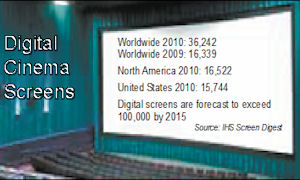The digital transition continues to chip away at the traditional ways of Hollywood. Case in point is the impending closure of a film lab as Technicolor anticipates a drop in business in developing feature film prints and dailies. Other companies servicing the industry that were heavily invested in film have adopted growth strategies with eyes set on the digital future. Camera manufacturer and rental house Panavision for instance is likely to never develop another film camera. Any pronouncement on the death of the 35mm or 70mm film print is premature, not with only one-third of movie screens in the U.S. installed with digital projection systems. What the entertainment industry is experiencing is the final pieces of the production and distribution pipeline – cameras and projectors – going through the analog to digital switch other disciplines like editing and visual effects have already completed. “Most of the major cinematographers have gotten comfortable that digital acquisition is a day to day thing,” said Bob Lambert, chairman emeritus and a special advisor to the board of the Entertainment Technology Center at USC. That comfort level then leads to uncomfortable decisions such as the closure of Technicolor’s North Hollywood film lab, which employs nearly 400 people. The lab processes studio and independent film prints, dailies and trailers. Technicolor also had film labs in New York, Canada, Europe and Thailand. Deluxe, the main competition for the film lab work, forecasts it will process 5 billion feet of film in 2011. Even with that amount of work, the company’s digital business will bring in more revenues. “That is why we are on the course to change Deluxe although the film business is growing,” Chief Operating Officer Warren Stein said. “We have made a big transformation.” Attempts to reach a representative at Technicolor were not successful. The closure, however, is expected to be completed by June when the company’s lease expires on the building on Lankershim Boulevard adjacent to the Universal Studios lot. Company adjusts Shutting down the lab follows a pattern by the entertainment technology company to make adjustments to reflect technological changes. In 2007, Technicolor made staffing cuts in its home entertainment division as the demand for standard definition DVDs began to drop. The company also sold a facility in Camarillo for DVD replication, packaging and distribution. Technicolor is hardly getting out of the film print business but since about 2000, when it worked with The Walt Disney Co. and Texas Instruments to deploy prototype digital cinema equipment into some theaters, the company’s eye has been on digital. The company’s ambitious plans of rolling out digital equipment by the thousands ran into the brick wall of the recession. As financing dried up, Technicolor scaled back its plans and now only handles the post-production for digital prints. The transformation that Technicolor has gone through was mirrored at Deluxe. In 2000, Deluxe was a 100 percent film company. This year, Deluxe will make less than half of its revenues from its film processing and distribution business, Stein said. Yet, the company’s film business is doing well and even growing as it captures more market share. In October, Deluxe signed a multi-year agreement to provide exclusive 35mm film print services to Universal Studios. Demand for cameras On the equipment side, Panavision, based in Woodland Hills, finds that 3D feature film production results in the rental of twice as many digital cameras. For the fourth installment of the “Pirates of the Caribbean” the rental house provided 20 Red cameras for 10 body-mounted camera rigs. Research and development is slanted toward the next generation of digital cameras. The transition with cameras and projectors doesn’t mean there will be less work. How films are captured and shown is what has changed. The ETC’s Lambert pointed to editors switching to digital editing equipment like Avid and Final Cut. That didn’t spell the death of an entire group of artists. There is more editing taking place now, Lambert said. Even the quality of digitally projected films hasn’t stood still. “The digital delivery is better than what it was five years ago,” Lambert said. “That is a good thing for everyone.”
